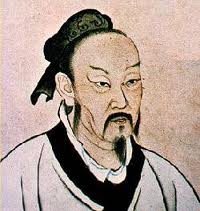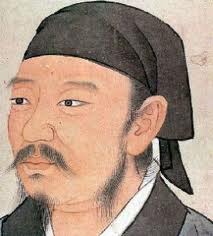Confucianism
Confucianism has dominated Chinese thought for the past twenty-five centuries. Catalyzed by Kong Zi, and reinforce by Mencius and Hzun Tzu. They are the founding fathers or the sages of Confucianism.
For Confucius - Jen is the prime virtue of life
For Mencius - Yi is the cardinal virtue
For Hsun Tzu - Li is the principal virtue for upholding Jen and practicing Yi.
Hence,, these three cardinal virtues (Jen, Yi, and Li) ate the norms of conducts for the Chinese people adhered to for thousand of years.
Jen - leads the was in promoting us to positive efforts for the good of others
Yi - oughtness of the situation, highest principle embodied in the acts of man
Li - outward expression of moral sentiment and standard of conduct which brings harmony to the previous two. It means social order, social institution and conventions.
Con Zi (Confucius)

“Good government consists in the ruler being a ruler, the minister being a minister, the father being a father, and a son being a son.”
- Lunyu 12.11
Confucius's philosophy was later to be defined as "Utilitarianism" by John Stuart Mills. He worked with the concept of utilitarianism to try to remove the flaws that Utilitarianism allows, such as slavery and cannibalism.
Confucius' (551-479 B.C.E.) philosophy (not religion) has endured even until today. He was concerned with morals and good government and believed that rulers and educated men had an obligation to set good examples and rule by persuasion rather than threats of punishment. After his death, about 70 of his disciples compiled his sayings into a book called the Lun-yu or Analects, (Upshur, 2002, p 105-107). In reading the Analects one can see that Confucian philosophy centers on the compassion and of loving others. Confucius argued that the only real understanding of a subject came from long and careful study and not by intuition. He taught his students morality, proper speech, government, and the refined arts he wrote five books referred to as the "Five Classics" that form the cannons of Confucianism.
Mencius

Mencius (fourth century B.C.E.) sought to defend the teachings of Confucius (sixth to fifth century B.C.E.) against other influential movements of thought, especially those associated with Mozi (fifth century B.C.E.) and Yang Zhu (fifth to fourth century B.C.E.). He is probably best known for the view that “human nature is good”, a view of human nature on the basis of which he defended the Confucian ideal and developed an account of the self-cultivation process. His view was subsequently challenged by Xunzi (third century B.C.E.), another major Confucian thinker, who defended the alternative view that “human nature is evil”.
Confucian thinkers of the Han (206 B.C – 220 C.E.) were influenced by the teachings of both, but by the late Tang (618–907), influential intellectuals such as Han Yu (768–824) came to regard Mencius as the true transmitter of Confucius' teachings. This view was shared by Confucian thinkers of the early Song (960–1279), and Zhu Xi (1130–1200) included the Mengzi (Mencius) as one of the Four Books, which became canonical texts of the Confucian tradition. Mencius came to be regarded as the greatest Confucian thinker after Confucius himself, and his teachings have been very influential on the development of Confucian thought in the Song, Ming (1368–1644), Qing (1644–1912), and up to modern times. Download
Xun Zi (Hsun Tzu)

Xunzi, along with Confucius and Mencius, was one of the three great early architects of Confucian philosophy. In many ways, he offers a more complete and sophisticated defense of Confucianism than Mencius. Xunzi lived toward the end of the Warring States period (453-221 BCE), generally regarded as the formative era for most later Chinese philosophy. It was a time of great variety of thought, comparable to classical Greece, so Xunzi was acquainted with many competing ideas. In reaction to some of the other thinkers of the time, he articulated a systematic version of Confucianism that encompasses ethics, metaphysics, political theory, philosophy of language, and a highly developed philosophy of education. Xunzi is known for his belief that ritual is crucial for reforming humanity’s original nature. Human nature lacks an innate moral compass, and left to itself falls into contention and disorder, which is why Xunzi characterizes human nature as bad. Ritual is thus an integral part of a stable society. He focused on humanity’s part in creating the roles and practices of an orderly society, and gave a much smaller role to Heaven or Nature as a source of order or morality than most other thinkers of the time. Although his thought was later considered to be outside of Confucian orthodoxy, it was still very influential in China and remains a source of interest today. Download